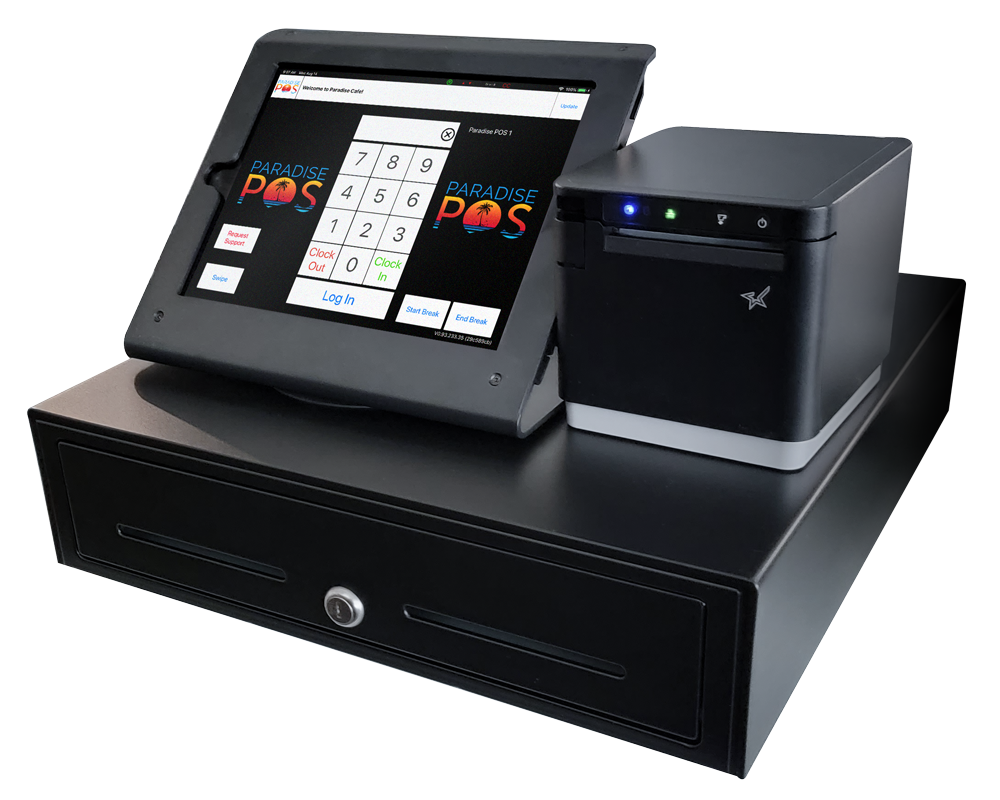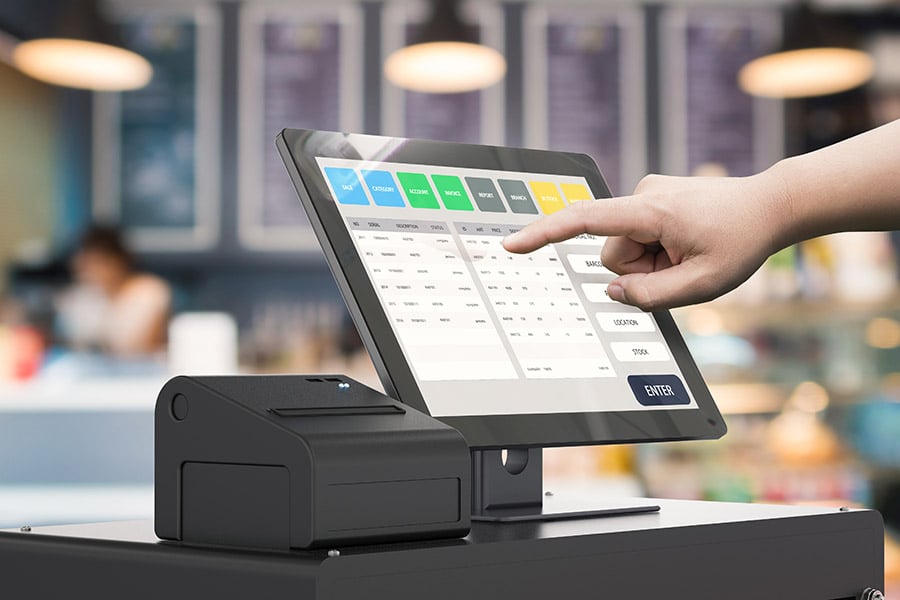Excitement About Pos
Excitement About Pos
Blog Article
Not known Facts About Pos Software

POS Machine: Retail Point-Of-Sale Solutions Streamline Transactions
Point Of Sale Systems - An Overview

Hardware Parts of a Point of Sale System What makes a POS system tick? It's not just software; the hardware plays a starring role. Think of it as the body to the software's brain. Without the best hardware, even the most sophisticated POS software is simply a quite face. Vital POS Hardware So, what are the must-haves? Let's break it down. The main processing system, often a computer system or tablet, is the heart of the operation. The display or touchscreen show allows staff to connect with the system. A barcode scanner speeds up the checkout process. Keep in mind the days of by hand entering each code? The reliable receipt printer provides consumers with a record of their purchase. A money drawer keeps your money safe and organized. A card reader permits clients to pay with credit or debit cards. Diving Deeper: here Beyond the Basics However wait, there's more! Depending upon your organization, you may require customized hardware. For example, a dining establishment might incorporate cooking area printers to relay orders, while a store may utilize label printers for item tagging. Ever wonder how your regional pastry shop instantly prints those delicious-looking labels? Selecting the Right Hardware: A Balancing Act Selecting the ideal hardware isn't almost purchasing the most costly devices. It's about finding the sweet area between functionality, toughness, and budget plan. A small service simply starting might choose for a more fundamental setup, while a high-volume seller will need robust, high-performance machines. Is it much better to buy brand-new or used? Consider your choices thoroughly. A new system offers the current innovation and service warranty protection, however a reconditioned system can save you money. The Future of POS Hardware What does the future hold? Anticipate to see much more integration with mobile devices, biometric scanners for employee authentication, and advanced analytics dashboards showed on bigger, clearer screens. Envision a world where inventory is automatically updated in real-time as products are scanned-- a world where you can track your very popular item from throughout the world. The possibilities are unlimited, and the hardware is constantly progressing to meet the needs of today's businesses. Are you all set to update your point of sale system?
Software Application Characteristics and Capabilities: The Heart of Your POS System
Ever see a seasoned barista glide through a busy early morning rush? Their secret isn't simply caffeine; it's a seamless dance with their POS system. The software application is the conductor of your service symphony, managing whatever from sales to inventory. What notes should you be listening for? What abilities truly matter in today's market?
Inventory Management: Beyond Counting Beans
Forget spreadsheets that haunt your dreams. Modern POS systems offer real-time inventory tracking, alerting you when your stock of artisanal coffee beans dips precariously low. Consider it as a digital guardian angel, preventing those awkward "Sorry, we're out!" moments to customers. What if you could likewise predict need based upon historical information? Lots of systems now provide forecasting tools, an effective weapon versus overstocking and lost sales. This assists avoid the dilemma of lacking popular products or collecting excess stock of slow-moving items, both of which can constrain cash flow and area.
Sales Reporting and Analytics: Translating the Information
Sales information is the new gold, and your POS system is the miner. Forget feeling in one's bones how much you offered today. Dive deep into the information to reveal patterns, recognize your best-selling products, and understand consumer habits. Which menu item sets perfectly with the daily special? Which promo resonated most with your clientele? These insights are not simply interesting; they're actionable intelligence. Without trustworthy sales reporting, browsing the intricacies of organization decision-making becomes like sailing without a compass, increasing the possibility of bad moves and missed chances.
Consumer Relationship Management (CRM): Structure Bridges, Not Walls
Remembering a routine client's name and favorite order is charming, however scaling that individual touch is tricky. POS systems with CRM abilities enable you to track client purchase history, choices, and even birthdays. Imagine instantly offering a discount on their birthday-- a little gesture that fosters loyalty and encourages repeat business. There is the prospective snag of bad data quality, which can lead to inaccurate client profiles and ineffective marketing efforts.
Payment Processing: Streamlining the Deal
The checkout experience can make or break a sale. Seamless integration with numerous payment approaches-- charge card, mobile wallets, even copyright-- is non-negotiable. Can your system handle split payments? Does it provide safe and secure tokenization to secure customer information? A clunky payment process resembles striking a sour note in your business symphony, possibly interrupting the whole efficiency. Ensuring compatibility with evolving payment technologies and adherence to security requirements are vital for preserving consumer trust and operational efficiency.
Worker Management: Keeping the Team in Sync
From clocking in and out to handling consents and tracking efficiency, staff member management includes improve operations and improve accountability. Is scheduling a nightmare? Lots of POS systems provide integrated scheduling tools, optimizing staffing levels based on anticipated need. A typical challenge that is typically ignored is the difficulty of incorporating employee management performances with payroll systems, which can lead to errors and ineffectiveness in wage calculations.
Advanced Characteristics: Leveling Up Your Operations
- Table Management: Suitable for dining establishments, this function enables you to picture your dining-room, track table status, and manage reservations.
- Commitment Programs: Reward your best consumers and motivate repeat organization with integrated commitment programs.
- Online Ordering Integration: Seamlessly integrate your POS system with online ordering platforms to broaden your reach.
Selecting the ideal POS system has to do with more than simply performance; it's about finding a partner that can grow with your service. Consider your present needs, expect future development, and do not be afraid to ask the tough questions. The best software application can change your organization from a disorderly cacophony into an unified masterpiece.
Industry-Specific POS System Applications
Believe of the local pastry shop, dynamic with morning clients yearning fresh croissants. A generic POS system might deal with transactions, however can it manage intricate recipes, track active ingredient inventory, or immediately change production schedules based on sales data? Most likely not. That is where the appeal of industry-specific POS systems shines.
Dining establishments and Hospitality
For busy restaurants, speed and precision are critical. The number of times have you seen servers handling orders, modifications, and splitting bills, all while attempting to provide outstanding service? A restaurant POS system improves these procedures, allowing for table management, kitchen area order tickets, and even online ordering integration. These systems typically include functions like ingredient-level inventory tracking, important for handling food expenses and decreasing waste. Ever wonder why your favorite dish is sometimes unavailable? It may come from an absence of proper inventory management.
- Table Management
- Kitchen Area Order Tickets
- Online Purchasing Integration
- Ingredient-Level Inventory Tracking
Retail Solutions
Retail, with its varied stock and consumer interactions, demands a different set of tools. Think of a boutique clothing shop struggling to keep track of sizes, colors, and seasonal collections utilizing a standard checkout system. An industry-specific retail POS system provides functions like barcode scanning, client loyalty programs, and detailed sales reporting. These systems can even integrate with e-commerce platforms, providing a seamless omnichannel experience for customers. Did you understand some retail POS systems can anticipate future sales trends based upon historical information? Now that is powerful!
The Perils of a Mismatch
Choosing the wrong POS system can create considerable operational obstacles. A clothing store utilizing a dining establishment POS, for instance, would discover it inappropriate for handling stock with sizes and colors. The absence of correct reporting and analytics could cause mistaken getting choices and lost revenue. The result might be similar to trying to fit a square peg in a round hole.
Key Factors to consider
Selecting an industry-specific POS system requires careful assessment. Think about your organization's distinct requirements and operational workflows. Does the system incorporate with existing software application? Does it use the needed reporting abilities? Is it scalable to accommodate future development? A well-chosen POS system is not simply a transaction tool; it's a tactical asset that can drive performance, improve customer complete satisfaction, and eventually, increase your bottom line. Keep in mind, it is a financial investment in your organization's future, not just a cost.
Security Considerations for Point of Sale Systems
Ever heard the tale of the mom-and-pop store that lost everything since of a single, ignored security defect in their POS system!.?. !? It's a cautionary tale, and it highlights a crucial element frequently eclipsed by the attraction of elegant features and structured operations. The truth is, a POS system is only as great as its security. What excellent is a system that crunches numbers in a flash if it enables bad guys to swipe client's data simply as rapidly?
The Vulnerability Minefield
The digital landscape is a battleground. Every POS system, no matter size or elegance, is a possible target. Are you genuinely got ready for the threats hiding around the corner? The genuine pinch comes when you find that your out-of-date software application has a gaping hole that hackers can exploit, turning your company into an unwitting accomplice in identity theft. The problem is that hackers are crafty and are constantly altering their techniques.
Common Security Gaps and Professional Tips
- Weak Passwords: "Password123" isn't sufficing. Use strong, special passwords for all POS system accounts and alter them frequently. Two-factor authentication is a must.
- Unsecured Networks: Your Wi-Fi is like leaving the front door open. Protect your network with strong encryption (WPA3 if possible) and consider a separate network for your POS system.
- Outdated Software Application: Software application suppliers patch security holes all the time. Stopping working to update is like welcoming problem. Set up automatic updates or schedule regular maintenance.
- Worker Training: Your personnel is your very first line of defense. Train them to acknowledge phishing efforts, safeguard passwords, and report suspicious activity.
Information File Encryption: Your Shield Against the Dark Arts
Believe of information encryption as a secret code. It scrambles delicate info, like credit card numbers, making it unreadable to unauthorized users. Without encryption, your consumers' monetary details are like sitting ducks, ripe for the picking by cybercriminals. It's not practically safeguarding your clients; it has to do with protecting your credibility and preventing hefty fines.
PCI Compliance: The Rulebook You Can't Ignore
If you accept credit cards, you're bound by the Payment Card Market Data Security Requirement (PCI DSS) It's a set of security standards designed to secure cardholder data. Failing to comply can result in fines, charges, and even the loss of your ability to process charge card payments. It's a headache, yes, however it's a necessary one. Consider PCI compliance as the expense of doing service in the digital age.
Consider this: every transaction processed through your point of sale is a possible entry point for malicious stars. By carrying out robust security procedures, you're not just safeguarding your organization; you're protecting your customers' trust and ensuring the long-lasting practicality of your operations. The security of your POS system isn't just a technical problem; it's an organization vital. It requires continuous watchfulness, proactive measures, and a commitment to remaining ahead of the curve.